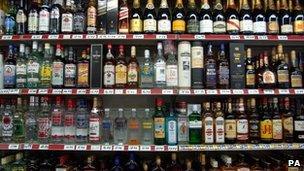Sheffield University study adjusts booze price impact
- Published
A minimum alcohol price would have a slightly smaller effect on consumption than first estimated, academics have told the Scottish government.
The University of Sheffield was asked to look at data and suggest a unit figure for a minimum price.
The researchers say a minimum price of 45p per unit of alcohol would reduce consumption by 4.3% rather than 4.7%.
The government's Alcohol Bill, external will become law before next summer, although ministers have to set a minimum price.
A report by the university in 2009 was used by the Scottish government to support their plans to introduce minimum prices for alcohol.
The Scottish government has estimated that the country's alcohol problems cost £3.56bn each year - or £900 for every adult.
Key findings from the updated report, external, which used a 45p minimum price as an illustrative figure, included;
overall weekly consumption across society would fall by 6%
alcohol related deaths would fall by about 60 in the first year and more than 300 by year 10 of the policy
alcohol-attributable morbidity decreases with an estimated reduction of 1,000 acute and 260 chronic illnesses in year one
a fall in general hospital admission of 1,660 in year one and 6,630 by year 10
harmful drinkers would pay an extra £132 per year, compared to just £9 for moderate drinkers
a fall in crime of 3,600 offences per year
about 36,500 fewer workdays lost through absenteeism and 1,180 fewer people unemployed because of alcohol misuse each year
harm reduction valued at £952m over 10 years

MSPs said they were worried supermarkets were undermining the spirit of the law
Labour's public health minister Dr Richard Simpson said the latest analysis showed that the big retailers were set to "cash in on a whopping windfall of £100m per year".
But Health Secretary Nicola Sturgeon said she believed minimum pricing could be a key weapon in the battle against alcohol misuse.
She added: "The findings also confirm that the measure will have more of an effect on heavy drinkers as they tend to favour cheaper alcohol.
"There is a clear link between the price of alcohol and consumption levels which is why we always intended to introduce a minimum price alongside the quantity discount ban.
"The support in favour of minimum pricing is now overwhelming, and I hope that this time around Scotland's MSPs will do the right thing and back this policy.
"Doctors, nurses, the police, academics and politicians, as well as growing numbers of the general population, have now recognised the harm that alcohol is doing to our communities and the benefit minimum pricing will bring - saving lives and reducing crime."
Cut deaths
However, Dr Simpson said although Labour was "absolutely determined" to tackle Scotland's drink problem it did not believe minimum unit pricing was the answer.
He explained: "We do not believe minimum unit pricing is the answer as it will not target problem drinks, will deliver a multi-million windfall for big supermarkets without providing a single extra penny for our NHS and big questions still remain over whether these plans will be struck down in the courts."
Liberal Democrat Health spokeswoman Alison McInnes believed minimum pricing was a "step in the right direction".
She said: "Cutting the number of alcohol related deaths and illnesses in Scotland is something we should all be striving for.
"Scottish Liberal Democrats have already signalled their support for minimum alcohol pricing and we will work constructively with ministers to take steps to rid Scotland of the scourge of alcohol abuse."
- Published17 January 2012
- Published1 November 2011
- Published1 November 2011
- Published1 November 2011
- Published21 October 2011
- Published1 October 2011
- Published30 September 2011
- Published10 November 2010